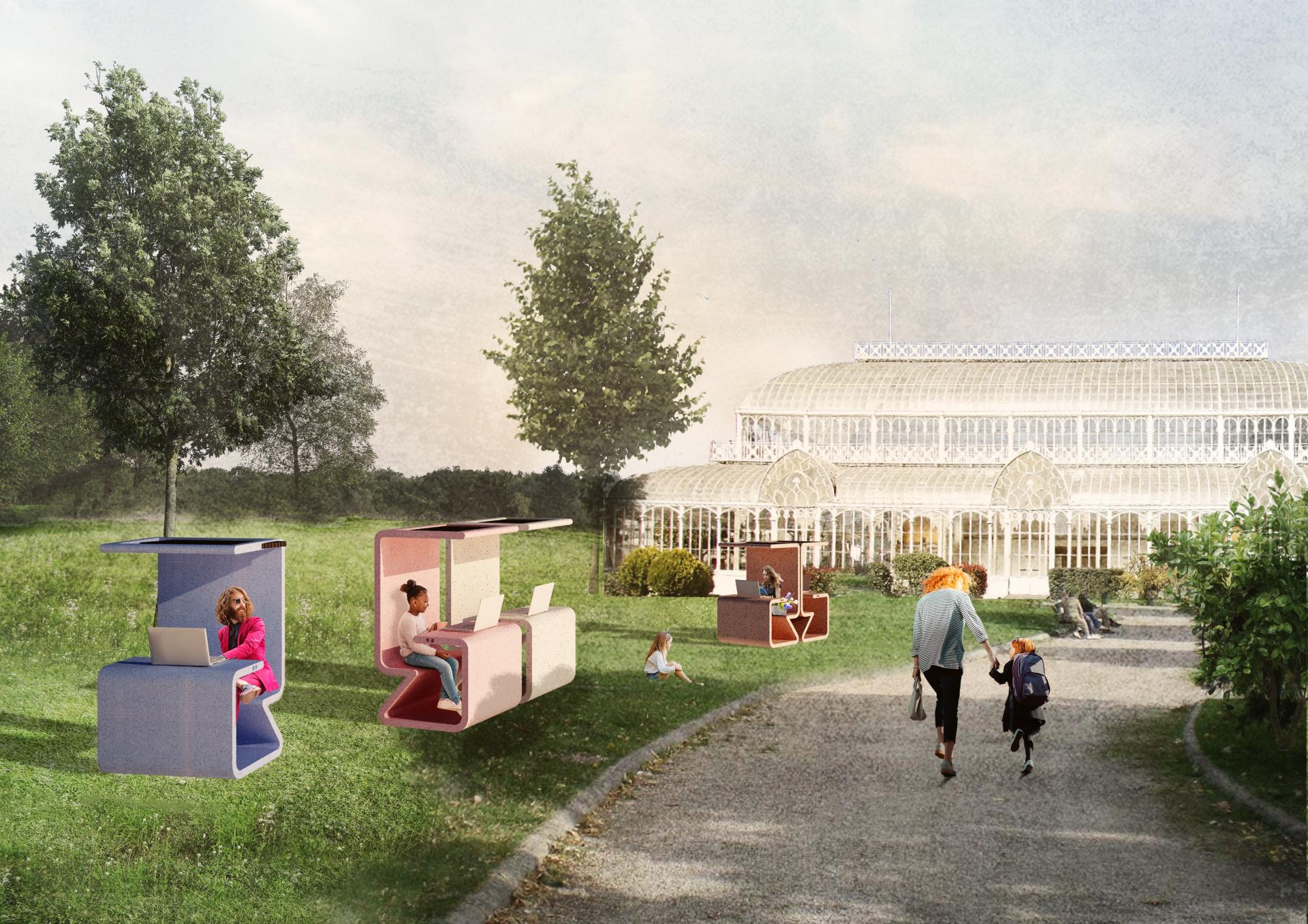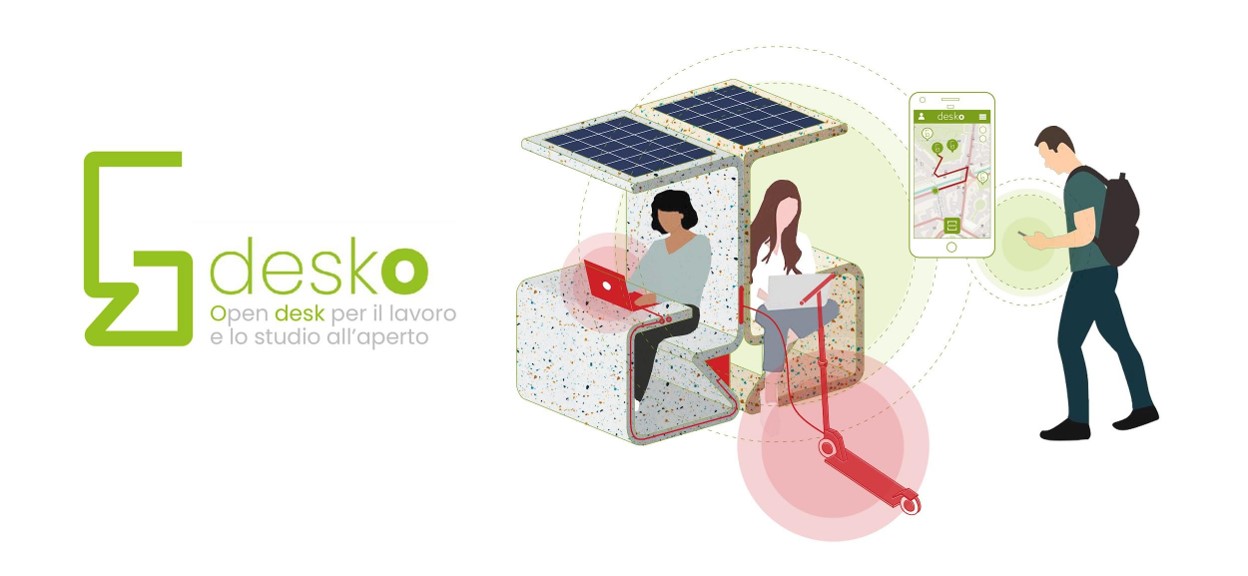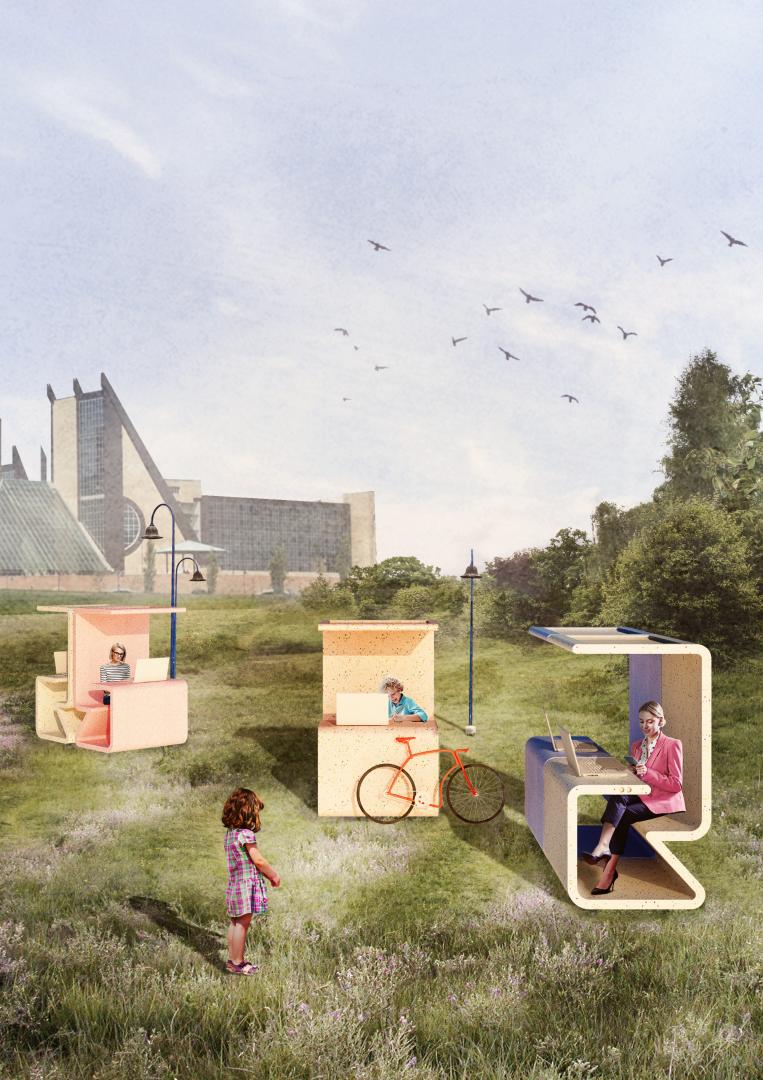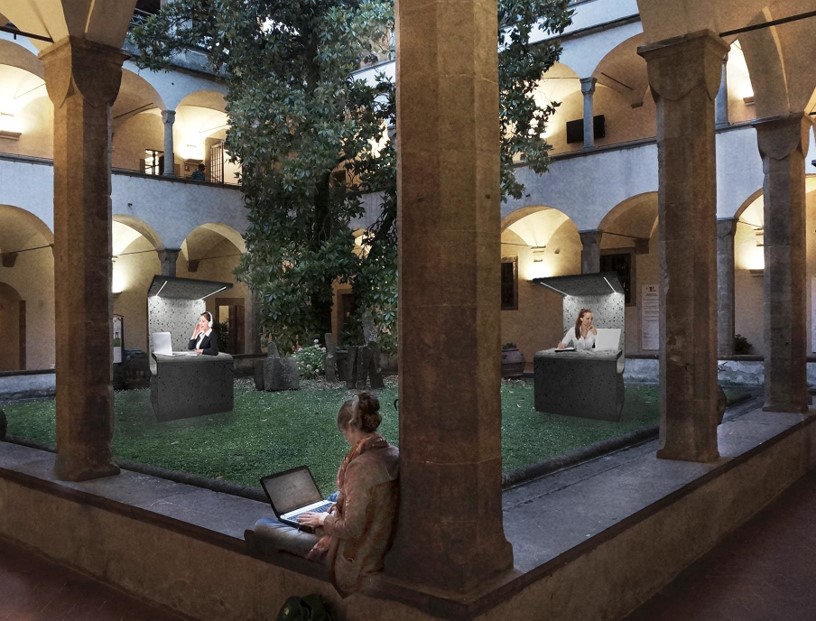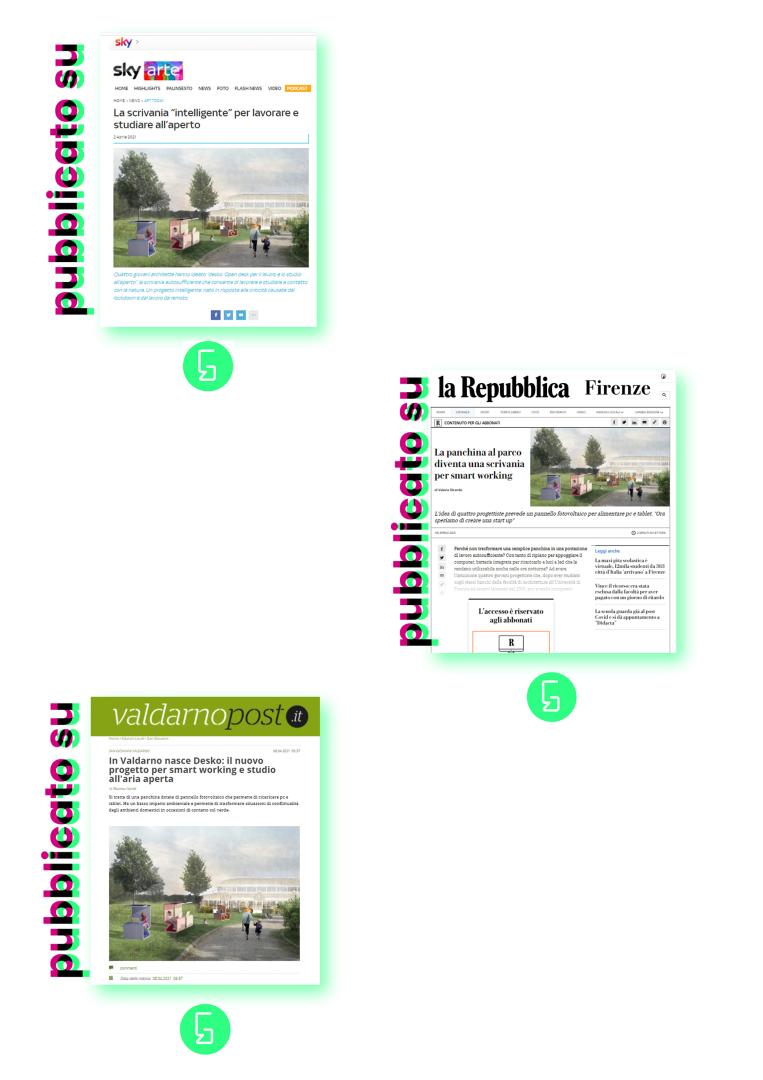Desko_Smart Open Seat
Basic information
Project Title
Full project title
Category
Project Description
Can we give a new life to plastic waste? Why don't we do it recycling them into smart devices to improve our daily studying and working routine? Designed by four dreaming architects during the pandemic lockdown, DeskoⓇ is a piece of innovative and circular urban furniture made out of recycled plastics that allows you to work or study outdoor even with electronic devices. It has solar power for that!
Geographical Scope
Project Region
Urban or rural issues
Physical or other transformations
EU Programme or fund
Which funds
Description of the project
Summary
Desko project aims to establish a circular supply chain within the use of plastic waste. Specifically, we designed an innovative model of urban furniture made of recycled plastics that can be used for outdoor working and/or studying activities. In fact, Desko is an urban seat that provides a working desk where people can use PCs, smartphones, mobility devices etc. It is energy self-sufficient and exploits renewable energy; electricity is supplied with a 20W PV panel integrated on the roof of the seat, connected to a battery that can power working devices for up to 6 hours. Desko is a sustainable example of urban furniture through which plastic waste can find new life and support wellbeing and health in daily activities. The product life-cycle intercepts local-recycled plastics and transforms them through additive manufacturing. In this way, we are able to customize the product while optimizing the material use and reducing manufacturing waste.
Desko has been designed as a modular, aggregable, and dismountable seat to adapt to different users and needs. It can be installed in controlled open spaces as courtyards of public libraries, universities, schools, companies, to offer people the opportunity to enhance their way of working/studying and reconnect them with the environment. Thanks to a mobile app, it is possible to look for available workstations, as well as to book them during the day.
As a confirmation of its potential, Desko has been reported on national news and we received positive feedback from different categories of stakeholders: users (smart-workers, students), public administrations and companies that are reshaping their vision, that were interested either in integrating Desko in projects of requalification of urban areas or in installing it in their facilities.
Since its inception, we started dialogues and collaborations with Italian partners in order to develop the first prototype.
Key objectives for sustainability
Our primary goal is to activate local, circular and sustainable supply chains in plastic waste treatment devloping an innovative and market-growing smart urban device. Desko's concept rethinks end-of-life plastics as a resource for a new product life-cycle; hence, the intrinsic waste value (energy, pollutants, costs) is maintained and enhanced reducing the need to extract and process virgin resources. Consistent with circular economy principles, our aim is to enstablish, togheter with key stakeholders and actors, a closed loop in the use of plastic waste for Desko’s manufacturing, in order to be able to keep track of resources from supply to end-of-life treatment and reimmission in material value chain. In this way, we want to reduce waste production and transfer to landfills, while bringing innovation in the built environment.
In addition, environmental sustainability is a core principle in product manufacturing. We selected additive manufacturing because it ensures low-energy demand, material optimization, and waste minimization, as well as high flexibility for manufacturing decentralization.
Regarding environmental sustainability and circularity, our project is exemplary for three main reasons: (1) it activates local and circular supply chain for plastic wastes management; (2) it uses them to develop an innovative product with a growing market perspective, that is recycled, recyclable, low-environmental impact and energy self-sufficient; (3) it exploits sustainable, low-emitting manufacturing techniques with high potentials for material optimization and waste reduction.
The product itself becomes a manifest of a new vision of productive processes, becoming an iconic element of this urgent conversion of resources management from linear to circular following the cradle-to-cradle paradigm. Especially in schools Desko becomes an educative and formative tool as a tangible concretisation of this strong idea of environmental sustainability.
Key objectives for aesthetics and quality
As a team of architects, we dedicated particular attention to aesthetics in designing the seat. Our goal is to exploit aesthetics as a means to improve space quality in our neighborhoods, as well as to raise awareness about environmental sustainability and resource circularity. Indeed, Desko is designed with an iconic shape that exalts the use of renewable energy (solar power); at the same time, the use of recycled material and the circular paradigm itself are perceived by the visible plastic shreds in the seat.
Concerning the experience of use, again our backgrounds allowed us to design the seat according to paradigms of ergonomy, inclusivity and comfort for different types of users. The use of additive manufacturing allows Desko to be mass-customized and adapted to peculiar needs of use. Moreover, being our team formed by an expert in lighting design, we optimized the aesthetics according to visual comfort performances and we integrated a dimmable low-energy lighting system on the roof.
The outdoor working and/or studying experience with Desko is significantly improved compared to traditional indoor activities. Indeed, as demonstrated by several studies, outdoor learning and working can provide numerous benefits for health; using Desko we are able to reconnect with our public spaces and the environment, reduce stress as well minimize sedentary lifestyle and isolation connected with remote working at home. Similarly, scientific researches proves benefits of shifting school activities outside; indeed, more and more educational programs are transforming traditional ways of learning by promoting outdoor education as a new way of learning, “opening” the classroom space towards the surrounding environment.
The seat was designed during the COVID lockdown, so its dimensions respect the distance between users, but its modular character allows users to obtain many combinations adapting to the needs of the installation space and encouraging social interaction.
Key objectives for inclusion
Desko started as a bottom-up project, a spontaneous initiative derived from our personal experiences of working remotely during the pandemic period.
During its development, it has then incorporated input and suggestions from numerous discussions with both public administrations and companies. Moreover, the design implementation of Desko has involved potential users by using digital tools; we collected ideas and feedback by sharing a questionnaire with 158 students and workers from Italy and European countries. With this phase we intended to collect ideas, suggestions and proposals for the development of the Desko concept, as well as to share issues derived from switching from traditional to remote work/studying indoors. The answers confirmed the need to rethink our way of working/studying by home; the 86% of users experienced loss of social interaction and health issues during the pandemic, while 45% felt the need to reconnect with outdoor green spaces. Moreover, 78% of people agreed that a closed contact with environment during working/studying activities could have had benefits on their productivity and adaptation capacity to emergency condition. The installation of Desko will also contribute to reactivating abandoned places in the neighborhood by adding new functions that can help people reconnect with specific parts of the city.
Desko design proves to be inclusive because it can be mass-customized according to user needs; the use of 3D printing for its production makes it easily reconfigurable to provide an unlimited number of configurations according to the principles of Universal Design.
Finally, regarding economic sustainability, we reduced life-cycle costs associated with production and management by exploiting local material chains, combined with low-energy manufacturing and optimization of material used. This allows reducing life-cycle costs and making the product economically sustainable especially for municipalities and public entities.
Physical or other transformations
Innovative character
Desko project combines the three components of sustainability, aesthetics and inclusion in the development of a circular productive reality with the aims to trigger virtuous and local material loops, reinforce and connect small manufacturers, and create sustainable and smart urban devices. Desko intends to improve the quality of daily life of citizens, becoming part of work and school activities. This is pursued by an iconic-shaped smart urban product, designed according to the principles of environmental sustainability, resource circularity, adaptability and customization. The project is able to intersect multiple dimensions of quality of life: reconnecting with nature, health and active lifestyle. This flexible urban device promotes a new way of living public spaces, strengthening social interactions between different categories of users like youngers and elderlies and reinforcing the sense of belonging. Desko has been designed with a careful study on design to obtain high quality on aesthetics and being able to make places more attractive.
Consequently, Desko promotes a double product and process innovation, going beyond the current model of linear production to achieve environmemtal, economic and social sustainability.
At the same time Desko will carry out sustainable forms of work/study, which promote contact with nature and psycho-physical wellbeing. Spending time outdoors in green spaces in the city, such as tree-lined avenues or parks, has been associated several times with various health benefits, such as improved cognitive development and a better mental and physical well-being. Time spent in nature helps you focus: the surrounding environment influences the way of studying; working or studying in contact with nature can improve attention. Learning to love and appreciate natural spaces ignites our environmental awareness and the awareness of having to choose a lifestyle based on sustainability.

